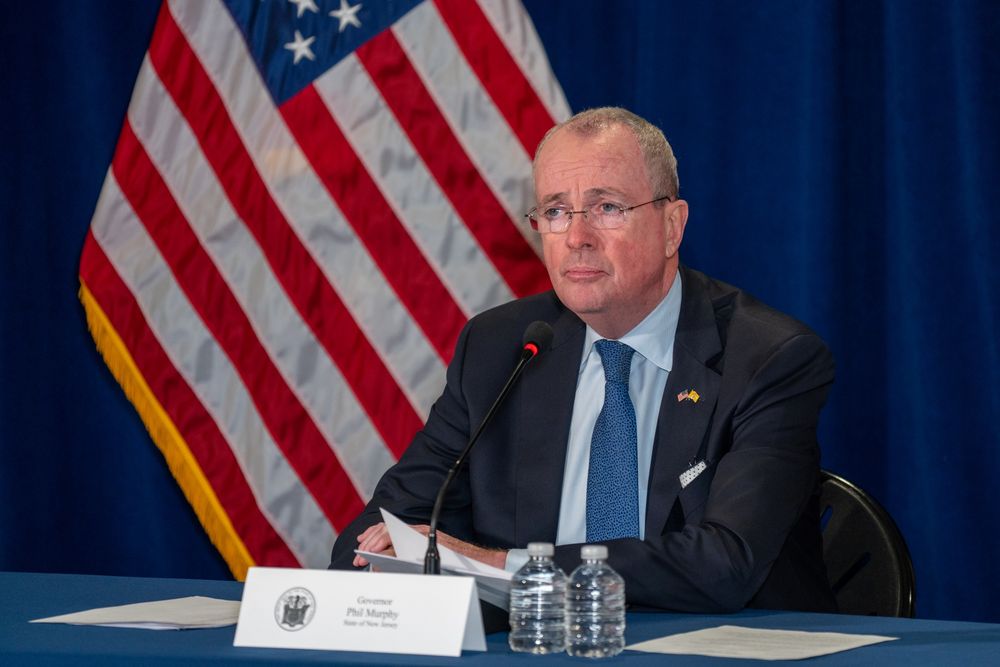New Jersey Governor Phil Murphy is pitching a borrowing plan to help make up for billions of dollars of lost revenue in the current and next budget amid a virus-induced lockdown.
The New Jersey Covid-19 Emergency Bond Act, outlined in draft legislation seen by Bloomberg, would authorize the Murphy administration to issue general-obligation bonds and “emergency liquidity notes,” and apply for loans from the federal government “to maintain and preserve the fiscal integrity of the state.” The borrowing would be repaid with sales taxes, with a guarantee that the levy -- currently 6.625% -- would increase if needed.
Mahen Gunaratna, Murphy’s communications director, declined to comment on the proposal when reached by telephone.
The draft leaves blanks for a borrowing amount. A 2004 New Jersey Supreme Court ruling prohibited borrowing for revenue purposes, and the state can issue general-obligation bonds only with voter approval. But the state constitution contains a potential argument in Murphy’s favor, citing “an emergency caused by disaster or act of God.”
The virus has infected more than 70,000 New Jerseyans and claimed 3,000 lives, giving New Jersey the second-highest toll among U.S. states, behind New York. On March 23, two days after Murphy ordered nonessential businesses to close and the state’s 9 million residents to be socially distant, his administration froze $920.6 million in spending.
Virus Hit
The bond proposal follows almost six weeks of action by Murphy and lawmakers to stem the spread of the deadly coronavirus. They’re trying to cope with the immediate financial fallout that’s expected to total several billion dollars while also positioning the state for fiscal recovery when workplaces, businesses and government services reopen.
Already, though, Senate President Steve Sweeney, a fellow Democrat and New Jersey’s highest-ranking state lawmaker, said he’s not inclined to support Murphy’s proposal.
“I’m not prepared to look at borrowing or writing a blank check without knowing where we stand,” Sweeney said in a phone interview. “The borrowing guarantees payback with the sales tax -- and the sales tax, last I checked, is pretty committed.”
Murphy, 62, a retired Goldman Sachs Group Inc. senior director, has said it’s too early to predict New Jersey’s financial need, but told reporters on Wednesday that revenues are “falling off the cliff.” On March 20, Murphy and Governors Andrew Cuomo of New York, Ned Lamont of Connecticut and Tom Wolf of Pennsylvania urged President Donald Trump and congressional leaders to consider at least $100 billion in direct cash assistance to their states.
“We already are forecasting billions of dollars in lost revenue,” the governors wrote. “Without this funding, we will be forced to make incredibly difficult choices in light of our new fiscal reality.”
Sales Taxes
The sales tax is New Jersey’s second-highest revenue source, contributing more than $10 billion annually, or about 25% of the general-fund receipts for the next fiscal year. During Murphy’s first year in office, the governor narrowly averted a government shutdown after lawmakers refused to support his proposal for a sales-tax increase.
Murphy, citing plunging state revenue and uncertain timing of federal stimulus money, signed legislation on April 14 to add three months to the state income- and business-tax filing deadlines and the fiscal 2021 budget due date.
Murphy publicly has declined to say how he would revise his proposed $40.9 billion budget for the fiscal year that will start on Oct. 1 rather than the typical July 1. But the draft legislation hints at some of the pressures before his administration, including $9 billion in school aid and a $4.6 billion pension payment, both record-high proposals that were pitched in February, before the state’s first case of Covid-19 was identified.
“The state expects that it will need to significantly revise the estimated revenues and projected appropriations for fiscal years 2020 and 2021,” according to the draft. It added: “The state may encounter future increases in the state’s actuarially recommended contributions to the state’s pension plans to the extent that the valuation of pension plans is affected by the deterioration in value in the investment markets.”
